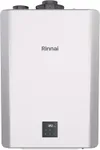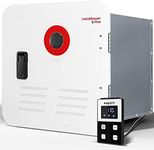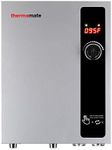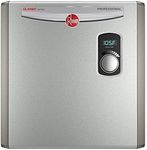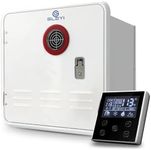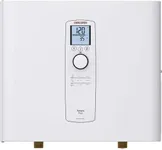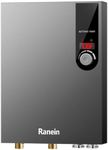Buying Guide for the Best Tankless Water Heaters
Choosing a tankless water heater can be a great way to enjoy endless hot water while saving space and energy. Unlike traditional water heaters with large tanks, tankless models heat water only when you need it, which can be more efficient and convenient. To find the best fit for your home, it's important to understand the main features and specifications that affect performance, installation, and long-term satisfaction. By focusing on your household's hot water needs and the characteristics of your home, you can select a tankless water heater that delivers comfort and reliability.Flow Rate (Gallons Per Minute, GPM)Flow rate tells you how much hot water the unit can provide at once, measured in gallons per minute (GPM). This is important because it determines how many showers, faucets, or appliances can run hot water at the same time without losing temperature. Lower flow rates (2-4 GPM) are suitable for small households or single uses, while higher flow rates (5-8+ GPM) are better for larger families or homes with multiple bathrooms. To pick the right flow rate, think about how many hot water activities might happen at once in your home, like running a shower and a dishwasher together.
Fuel Type (Gas vs. Electric)Tankless water heaters can be powered by natural gas, propane, or electricity. The fuel type affects installation, operating costs, and sometimes performance. Gas models usually provide higher flow rates and are better for larger homes, but they need proper venting and gas lines. Electric models are easier to install and maintain, making them a good choice for smaller homes or places where gas isn’t available. Consider what energy sources are available in your home and how much hot water you need when choosing the fuel type.
Temperature RiseTemperature rise is the difference between the incoming cold water temperature and the desired hot water temperature. This matters because the colder your incoming water, the harder the heater has to work to reach your preferred temperature. Tankless heaters are rated for how much they can heat water at a given flow rate. If you live in a cold climate, you may need a more powerful unit. To choose correctly, estimate your incoming water temperature and how hot you want your water, then check if the heater can handle that difference at your needed flow rate.
Energy Efficiency (Energy Factor or UEF)Energy efficiency tells you how much of the energy used by the heater actually goes into heating your water, rather than being lost as waste. This is usually shown as an Energy Factor (EF) or Uniform Energy Factor (UEF). Higher numbers mean better efficiency, which can save you money and reduce environmental impact. When comparing models, look for higher efficiency ratings, especially if you use a lot of hot water or want to minimize energy use.
Size and Installation RequirementsTankless water heaters are compact, but they still need to fit in your chosen space and meet certain installation needs, like venting for gas models or electrical capacity for electric ones. Some units are designed for indoor use, while others are made for outdoor installation. Make sure to check the space you have available and any special requirements, such as venting or electrical upgrades, to ensure the unit you choose can be installed safely and conveniently in your home.
Maintenance and LongevityTankless water heaters generally last longer than traditional tank models, but they do require regular maintenance, such as descaling to prevent mineral buildup. Some models are easier to maintain than others, with features like easy-access panels or built-in alerts. If you want a hassle-free experience, look for units with simple maintenance requirements and consider your water hardness, as harder water may require more frequent care.
